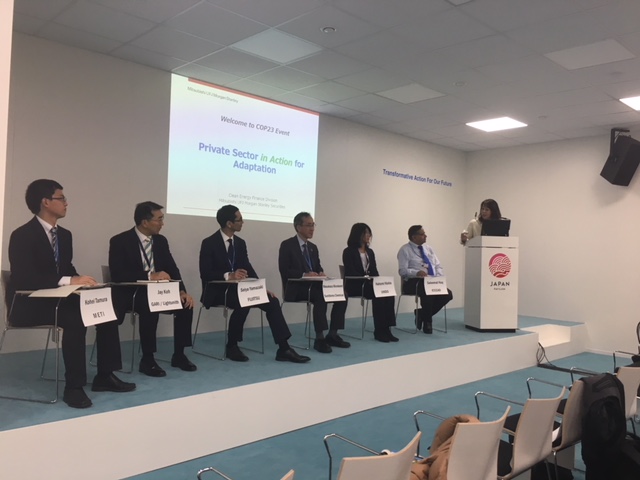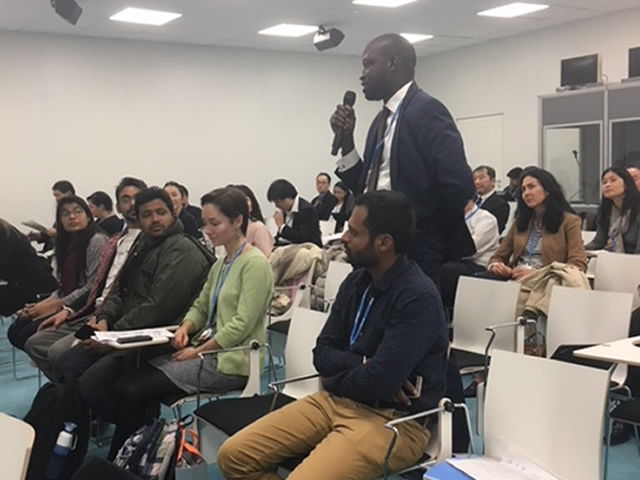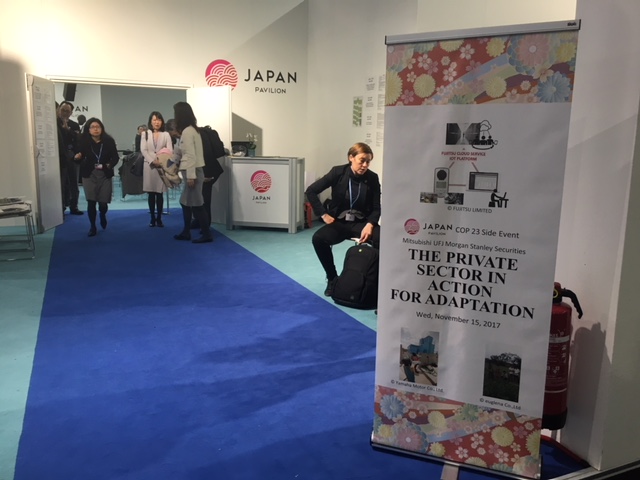
14:30 - 16:00
| Event title | The Private Sector in Action for Adaptation |
|---|---|
| Contents | Since Paris Agreement, there has been an emphasis on aligning public and private sectors' climate actions and many private corporations have begun to publicly announce their climate goals. Nevertheless, compared to their goals for clean energy use, the private sector's engagement in addressing climate change adaptation has attracted little notice. At this event, adaptation needs of vulnerable developing countries and how innovative adaptation business cases by multinational corporations as well as by emerging start-ups can address such needs will be show-cased for their effect on the society in reference to Sustainable Development Goals (SDGs) and Sendai Framework for Disaster Risk Reduction. At the same time, unique financing strategies will be shared to solicit further discussion on how to scale-up private sector participation to contribute to adaptation objectives. |
| Keywords | Adaptation, Private Sector, Finance, Sustainable Development Goals (SDGs) |
| Speakers Name and Title |
|
| Organiser / Co-organiser |
|
Welcome remarks (5 min):
Private Sector in Action for Adaptation
Presentations (60 min, 10 min*6 presentations):
Adaptation needs in developing countries and potential for collaboration with the private sector
Changing with the Climate: UNIDO‘s experience
Sharing Experience from Business Perspective - Chemical Industry -
The Power of ICT: Fujitsu’s approaches to Climate Change Adaptation
Private Sector Adaptation Finance
Promoting Adaptation Business
Q&A and discussion (25 min):
Mari Yoshitaka, Chief Consultant, Clean Energy Finance Division Mitsubishi UFJ Morgan Stanley Securities, noted in her opening address that the climate change adaptation case book was developed through the survey of Japanese corporate adaptation activities in developing countries covering more than 2000 companies of which several kinds of technologies and services were extracted. She expected the further dissemination and promotion of adaptation business through the discussion at this event.
Saleemal Huq, PhD, Director, International Center for Climate Change and Development at Independent University, pointed out his view on the importance of business activities to benefit both contributions to adaptation and local farmers in area of salinization measures as an example in Bangladesh.
Nahomi Nishio, International Consultant, Department of Environment, United Nations Industrial Development Organization (UNIDO), introduced UNIDO’s low-carbon and climate resilient industrial development program under Japanese government support. She explained the activity which achieves the increased productivity and resilience of local industry through technology.
Masakazu Murakami, D.V.M, Senior Associate, Responsible Care Department, Sumitomo Chemical Company, Limited, introduced Sumitomo Chemical’s products, insecticidal mosquito net that is endorsed by WHO and contributes to preventing malaria, biorational products that contribute to stable food supply. He stressed Sumitomo Chemical’s commitment of business development based on social contribution including SDGs.
Seiya Yamazaki, Director, Environmental Engineering Department, Environmental Technology Division, Corporate Environmental and CSR Strategy Unit, FUJITSU LIMITED, introduced FUJITSU’s activities related to global environmental issues. He explained FUJITSU’s contribution to adaptation through ICT technology and case study of affordable and effective solution in developing country.
Jay Koh, Founder & Chair, Global Adaptation & Resilience Investment Working Group (GARI), introduced a plan of establishing a fund in order to oncentrte the finance on adaptation and resilience which has been scattered in several area. He said that the Global Environment Facility and Nordic Development Fund have expressed their intent to invest in the fund.
Kohei Tamura, Assistant Director, Global Environment Partnership Office, Ministry of Economy, Trade and Industry of Japan (METI), explained that METI is supporting project formation through feasibility study and raising recognition of adaptation activities in Japan among other activities. He expressed intent to put more effort in business matching in future.
In the discussion and Q&A session, first Dr. Huq commented that the first step towards developing successful adaptation business is getting to know the site and many corporations should visit Bangladesh to learn the present situation.
Next, a question was raised by Bangladesh participant on whether it is possible to offer seawater desalination and water purification technologies, which are demanded in countries like Bangladesh in low energy and equipment costs. Mr. Murakami explained that issues are fully recognized and working on it chemical industry-wide. There was a further suggestion to Mr. Yamazaki that lower cost in operating ICT technology shall be possible by ability improvement of human resources through education and training in developing countries. Mr. Yamazaki agreed in basic thinking and direction.
Also Senegal participant commented UNIDO’s activity contributes not only adaptation but also productivity and energy saving and it is an innovative activity that leads to doing more with less”.
Kikuko Shinchi, Mitsubishi UFJ Morgan Stanley Securities Co., Ltd.



Copyright Ministry of the Environment Government of Japan. All rights reserved